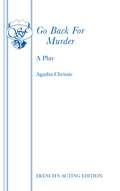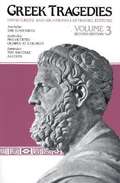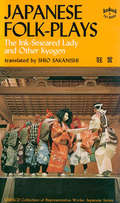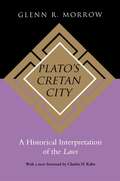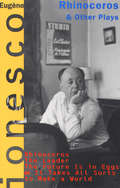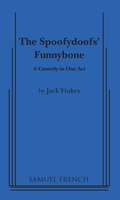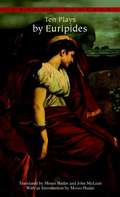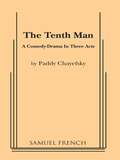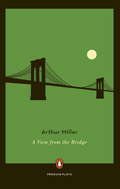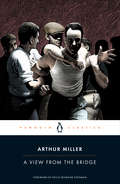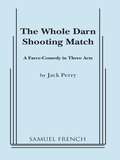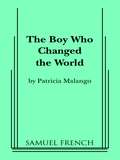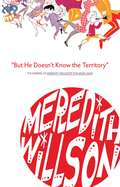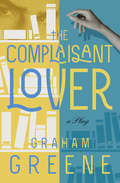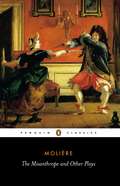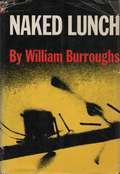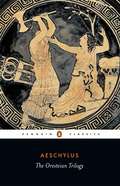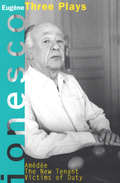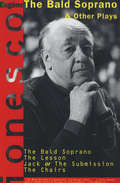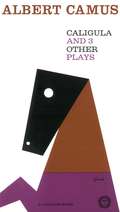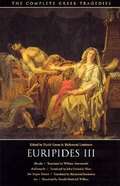- Table View
- List View
Go Back for Murder
by Agatha ChristieDrama / 6m,4f / Unit Set. Imprisoned for poisoning her husband fifteen years earlier, Caroline Crale finds herself at death's door, and writes a letter expressing her undeniable innocence to her daughter Carla. Carla, aided by Justin Fogg - a former admirer of Caroline - persuades those present on the day of her father's death to return to the scene of the crime. When the witnesses reassemble, Fogg discovers the identity of the true murderer, and Carla discovers her true feelings for Fogg
Greek Tragedies, Vol. 3
by David Grene Richmond LattimoreIn three paperback volumes, the Grene and Lattimore editions offer a selection of the most important and characteristic plays of Aeschylus, Sophocles, and Euripides from the nine-volume anthology of The Complete Greek Tragedies. This volume contains Aeschylus: The Eumenides; Sophocles: Philoctetes, Oedipus at Colonus; Euripedes: The Bacchae, Alcestis.
Hitchcock's Films Revisited
by Robin WoodWhen Hitchcock's Films was first published, it quickly became known as a new kind of book on film and as a necessary text in the growing body of Hitchcock criticism. <p><p>This revised edition of Hitchcock's Films Revisited includes a substantial new preface in which Wood reveals his personal history as a critic -- including his coming out as a gay man, his views on his previous critical work, and how his writings, his love of film, and his personal life and have remained deeply intertwined through the years. This revised edition also includes a new chapter on Marnie.
Japanese Folk Plays: The Ink Smeared Lady and Other Kyogen
by Shio SakanishiThis collection of Japanese folk plays reveals a previously unknown and decidedly unaristocratic element to Japanese theater.<P><P>Interspersed between the stately, slower paced dramas of Japan's Noh theater are the delightful comic plays or interludes known as Kyogen. These brief plays evolved from the bawdy skits that were rousingly enjoyed by the plebeian populaces of the cities in feudal Japan some hundreds of years ago when Noh itself was a pastime and entertainment exclusively reserved for the aristocracy.Today they still provide delightful relief from the sustained and concentrated action of the Noh play that has changed very little throughout the centuries. Among the various forms of classical Japanese drama, the flamboyant action and brilliant coloring Kabuki has perhaps enabled it to be the most easily understood; and the Noh, in a number of excellent translations, has become widely known for its poetic beauty. But the Kyogen, equally deserving of attention, have remained relatively unknown. Only now, with this new edition of Miss Sakanishi's excellent translations, are they at last readily available to the Western reader.
Plato's Cretan City: A Historical Interpretation of the Laws
by Glenn R. MorrowPlato's Cretan City is a thorough investigation into the roots of Plato's Laws and a compelling explication of his ideas on legislation and social institutions. A dialogue among three travelers, the Laws proposes a detailed plan for administering a new colony on the island of Crete. In examining this dialogue, Glenn Morrow describes the contemporary Greek institutions in Athens, Crete, and Sparta on which Plato based his model city, and explores the philosopher's proposed regulations concerning property, the family, government, and the administration of justice, education, and religion. He approaches the Laws as both a living document of reform and a philosophical inquiry into humankind's highest earthly duty.
Rhinoceros and Other Plays: Includes: The Leader; The Future Is In Eggs; It Takes All Kinds To Make A World (Books That Changed the World)
by Eugène Ionesco“With outrageous comedy” this classic of Absurdist drama “attacks the most serious subjects: blind conformity and totalitarianism, despair and death” (The New York Times).In Rhinoceros, as in his other plays, Eugene Ionesco startles audiences with a world that invariably erupts in explosive laughter and nightmare anxiety. A rhinoceros suddenly appears in a small town, tramping through its peaceful streets. Soon there are two, then three, until the “movement” is universal. This is not an invasion of wild animals, but a transformation of average citizens into beasts, as they learn to move with the times. As the curtain comes down, only one desperate man remains.Rhinoceros is a commentary on the absurdity of the human condition made tolerable only by self-delusion. It shows us the struggle of the individual to maintain integrity and identity in a world where all others have succumbed to the “beauty” of brute force and mindlessness.
Spoofydoof's Funnybone
by Jack FrakesComedy / 7m, 9f / The spoofydoofs live peacefully under a tree-- their only worry is the Hurry Scurries. Gigles finds a funnybone that makes everyone laugh. His search party is chased by Polly and her dog-- and by gloomy faced Aunt Nettie, a Hurry Scurry. The spoofydoofs catch her and hand her the funnybone. She happily returns to Hurry Scurry land to spread laughter.
Ten Plays
by Moses Hadas John Mclean EuripidesThe first playwright of democracy, Euripides wrote with enduring insight and biting satire about social and political problems of Athenian life. In contrast to his contemporaries, he brought an exciting--and, to the Greeks, a stunning--realism to the "pure and noble form" of tragedy. For the first time in history, heroes and heroines on the stage were not idealized: as Sophocles himself said, Euripides shows people not as they ought to be, but as they actually are.
The Tenth Man: A comedy-Drama in Three Acts
by Paddy ChayefskyIn an old meeting room now used as a temple, a rabbi and various Jews meet for prayer on a winter day. They are not all devout; one is a comic atheist who says he only comes to the temple to keep warm and another is a young agnostic lawyer who has made a mess of his life and whom analysis is keeping from brink of suicide. One of the ten men who come this day brings his granddaughter who is in a trance. He believes she is possessed by a dybbuk; some of the others think she is just plain crazy. She glides from periods of lucidity into absolute irrationality and then into trance. During saner moments, she and the young agnostic are attracted to one another. The rabbi, convinced she has a dybbuk, arranges an exorcism. At the culmination of the ritual, it is the dybbuk of the young man that is exorcised, the one that has prevented him from loving anyone.
A View from the Bridge
by Arthur MillerSet in the 1950s on the gritty Brooklyn waterfront, A View from the Bridge follows the cataclysmic downfall of Eddie Carbone, who spends his days as a hardworking longshoreman and his nights at home with his wife, Beatrice, and orphan niece, Catherine. But the routine of his life is interrupted when Beatrice's cousins, illegal immigrants from Italy, arrive in New York. As one of them embarks on a romance with Catherine, Eddie's envy and delusion plays out with devastating consequences. This edition includes a forward by Philip Seymour Hoffman and an introduction by Arthur Miller.For more than seventy years, Penguin has been the leading publisher of classic literature in the English-speaking world. With more than 1,700 titles, Penguin Classics represents a global bookshelf of the best works throughout history and across genres and disciplines. Readers trust the series to provide authoritative texts enhanced by introductions and notes by distinguished scholars and contemporary authors, as well as up-to-date translations by award-winning translators.From the Trade Paperback edition.
A View from the Bridge (York Notes Ser.)
by Arthur Miller Philip Seymour HoffmanSet in the 1950s on the gritty Brooklyn waterfront, A View from the Bridge follows the cataclysmic downfall of Eddie Carbone, who spends his days as a hardworking longshoreman and his nights at home with his wife, Beatrice, and orphan niece, Catherine. But the routine of his life is interrupted when Beatrice's cousins, illegal immigrants from Italy, arrive in New York. As one of them embarks on a romance with Catherine, Eddie's envy and delusion plays out with devastating consequences. This edition includes a forward by Philip Seymour Hoffman and an introduction by Arthur Miller.For more than seventy years, Penguin has been the leading publisher of classic literature in the English-speaking world. With more than 1,700 titles, Penguin Classics represents a global bookshelf of the best works throughout history and across genres and disciplines. Readers trust the series to provide authoritative texts enhanced by introductions and notes by distinguished scholars and contemporary authors, as well as up-to-date translations by award-winning translators.From the Trade Paperback edition.
The Whole Darn Shooting Match: A Farce-Comedy in Three Acts
by Jack PerryZany exploits, hilarious antics and wild ideas follow fast and furiously throughout this comedy about the advertising world. It is set in the Creative Room where a flamboyant TV commercial writer, an alcoholic artist, a flippant girl Friday, and their beloved leader, the Creative Director, engage in a running feud with the new president of the company, an efficiency expert, the office boy and everyone else who dares to interfere with their off beat rules of office conduct.
The Boy Who Changed World
by Patricia MalangoHigh School \ Comedy \ 8m, 6f, optional extras \ 3 exteriors or 1 set. \ A prehistoric teenager has a problem: he is flunking fighting, hunting, and fishing and he faces the certain death of exile. To impress glamorous Dorothy, he invents painting, poetry, and music all humiliating failures. Just in time to save himself he invents the wheel and the villagers reward him with the status of manhood; it even looks as if his father will be elected mayor after all. Dorothy is available now, but George has learned the meaning of love and chooses another.
But He Doesn't Know the Territory
by Meredith WillsonComposer Meredith Willson once described The Music Man as "an Iowan's attempt to pay tribute to his home state." Never once forgetting his roots, Willson reflects on the ups and downs, surprises and disappointments, and finally successes of the making of one of America's most popular musicals. His whimsical, personable writing style will bring readers back in time with him to the 1950s to experience firsthand the exciting trials and tribulations of creating a Broadway masterpiece. A newfound admiration for The Music Man--and the man behind the music--is sure to follow.
The Complaisant Lover: A Play
by Graham GreeneA “delicious . . . champagne cocktail” of a stage comedy about a sporting British couple’s marital—and extramarital—propositions (New York Herald Tribune). Victor Rhodes, a hearty and amiable dentist in North London, has what he thinks is a happy marriage. It’s stable, routine, and comfortably platonic. Five years and counting, his wife, Mary, feels the same way. That’s why she’s taken a secret lover—their good friend, Clive Root, an antiquarian bookseller for whom relieving complaisant husbands of their duty is a pleasure. But when Mary and Clive connive a rendezvous in Amsterdam, their getaway takes a surprising turn with a visit from Victor. What’s now at risk for Mary is more than a marriage to a man she genuinely loves but also a perfectly fulfilling affair with a man she truly desires. In this “sin-and-tonic work of art,” Mary isn’t about to give up either of them (Spectator). “An expert at badinage full of quiet English verve, Mr. Greene writes with smooth sophistication” in his last play—a comedy of lies, cheats, and betrayals—produced by Sir John Gielgud at the Globe Theatre, London, in 1959 (The New York Times). Two years later, it debuted on Broadway, with a cast including Sandy Dennis, Michael Redgrave, and Gene Wilder.
The Crucible: A Play in Four Acts
by Arthur MillerMiller turns, for his setting, to the grim days of the Salem witch trials, and brings into focus an issue that still weighs heavily on the American civilization: the problem of guilt by association. Historical fiction.
Euripides V (Electra/Phoenician Woman/Bacchae)
by Richmond Lattimore David GreneA Softcover- Pages are clean. Binding is tight. Cover has minimal shelf wear. Back cover has some corner crease. If you are not totally satisfied please return item for a full refund. Please send me a e-mail before leaving me a bad feedback so it can be resolved. We do our best to accurately describe the condition of items that we sell, but we are not the original owners of our items and we are not able to inspect every page so we may miss something. Older items tend to have some degree of tanning and if we state that an item is an ex-library copy, expect the normal stamps and stickers that are typical for those items. These are all used items unless otherwise specified and although we find items that look new, the majority have been used. So, expect some wear/creasing from normal use. We always ship your package in a timely manner. Unfortunately we have no control over carrier shipping time. Our goal is your 5 star feedback and we will do everything we can to ensure you are happy with your purchase.
Four Great Plays by Henrik Ibsen
by Henrik IbsenGhosts—The startling portrayal of a family destroyed by disease and infidelity. <p><p>The Wild Duck—A poignant drama of lost illusions. <p><p>An Enemy Of The People—Ibsen’s vigorous attack on public opinion. <p><p>And A Doll's House—The play that scandalized the Victorian world with its unsparing views of love and marriage, featuring one of the most controversial heroines—and one of the most famous exists—in the literature of the stage.
The Misanthrope and Other Plays
by Jean-Baptiste MoliereIn the seventeenth century, Molière raised comedy to the pitch of great art and, three centuries later, his plays are still a source of delight. He created a new synthesis from the major comic traditions at his disposal. This collection demonstrates the range of Molière's comic vision, his ability to move between the broad and basic ploys of farce to the more subtle and sophisticated level of high comedy. The Misanthrope appears along with Such Preposterously Precious Ladies, Tartuffe, A Doctor Despite Himself, The Would-Be Gentleman, and Those Learned Ladies.
Naked Lunch
by William S. BurroughsDelirious, nonlinear ravings of a junkie in hell. Also includes excerpts from the Boston trial where it was declared not obscene in 1966.
The Oresteian Trilogy
by AeschylusAeschylus (525-c.456 bc) set his great trilogy in the immediate aftermath of the Fall of Troy, when King Agamemnon returns to Argos, a victor in war. Agamemnon depicts the hero's discovery that his family has been destroyed by his wife's infidelity and ends with his death at her callous hand. Clytemnestra's crime is repaid in The Choephori when her outraged son Orestes kills both her and her lover. The Eumenides then follows Orestes as he is hounded to Athens by the Furies' law of vengeance and depicts Athene replacing the bloody cycle of revenge with a system of civil justice. Written in the years after the Battle of Marathon, The Oresteian Trilogy affirmed the deliverance of democratic Athens not only from Persian conquest, but also from its own barbaric past.
Amédée, The New Tenant, Victims of Duty: Three Plays (Books That Changed the World)
by Eugène IonescoThree hilarious and provocative plays by the absurdist pioneer who remains “one of the most important and influential figures in the modern theater” (Library Journal).The author of such modern classics as The Bald Soprano, Exit the King, Rhinoceros, and The Chairs, Eugene Ionesco’s plays have become emblematic of Absurdist theatre and the French avant-garde. This essential collection combines The New Tenant with Amédée and Victims of Duty—plays Richard Gilman has called, along with The Killer, Ionesco’s “greatest plays, works of the same solidity, fulness, and permanence as [those of] his predecessors in the dramatic revolution that began with Ibsen and is still going on.”In Amédée, the title character and his wife have a problem—not so much the corpse in their bedroom as the fact that it’s been there for fifteen years and is now growing, slowly but surely crowding them out of their apartment.In The New Tenant, a similar crowding is caused by an excess of furniture—as Harold Hobson said in the London Times, “there is not a dramatist . . . who can make furniture speak as eloquently as Ionesco, and here he makes it the perfect, the terrifying symbol of the deranged mind.”In Victims of Duty, Ionesco parodies the conformity of modern life by plunging his characters into an obscure search for “mallot with a t.”
The Bald Soprano: & Other Plays (Books That Changed the World)
by Eugène IonescoThis Absurdist masterpiece by the author of Rhinoceros “is explosively, liberatingly funny…a loony parody with a climax which is an orgy of non-sequiturs” (The Observer).Written in 1950, Eugene Ionesco’s first play, The Bald Soprano, was a seminal work of Absurdist theatre. Today, it is celebrated around the world as a modern classic for its imagination and sui generis theatricality. A hilarious parody of English manners and a striking statement on the alienation of modern life, it was inspired by the strange dialogues Ionesco encountered in foreign language phrase books.Ionesco went on to become an internationally renowned master of modern drama, famous for the comic proportions and bizarre effects that allow his work to be simultaneously hilarious, tragic, and profound. As Ionesco has said, “Theater is not literature. . . . It is simply what cannot be expressed by any other means.”
Caligula and Three Other Plays (Vintage International)
by Albert Camus'One word to tell the reader what he will not find in this book. Although I have the most passionate attachment for the theater, I have the misfortune of liking only one kind of play, whether comic or tragic.'
Euripides III: Hecuba, Andromache, The Trojan Women, Ion (The Complete Greek Tragedies #5)
by David Grene Richmond Lattimore EuripidesVolume 3 of the Grene and Lattimore editions offers the most comprehensive selection of the Greek tragedies available in English comprising Hecuba, Andromache, The Trojan Women, and Ion.
